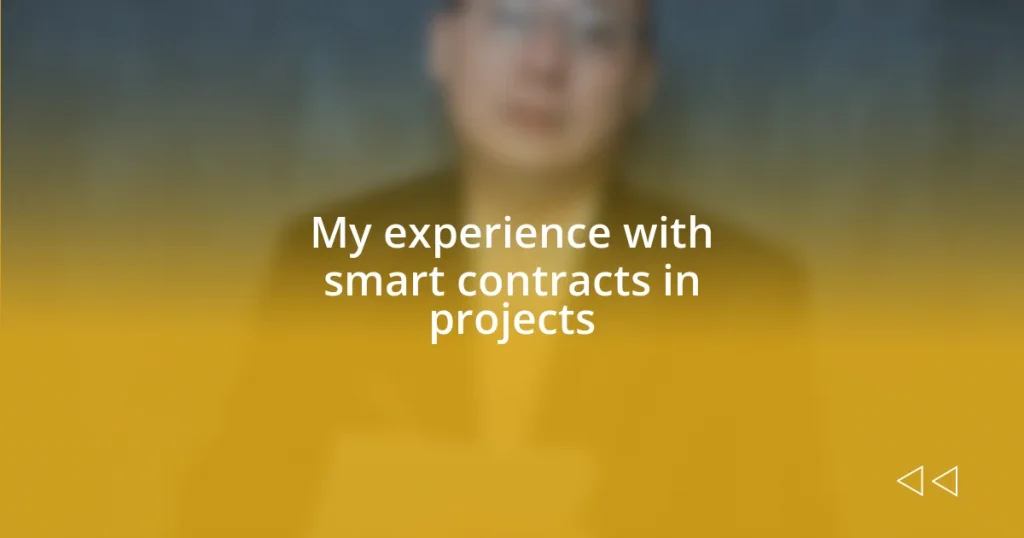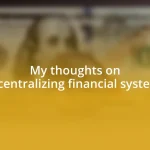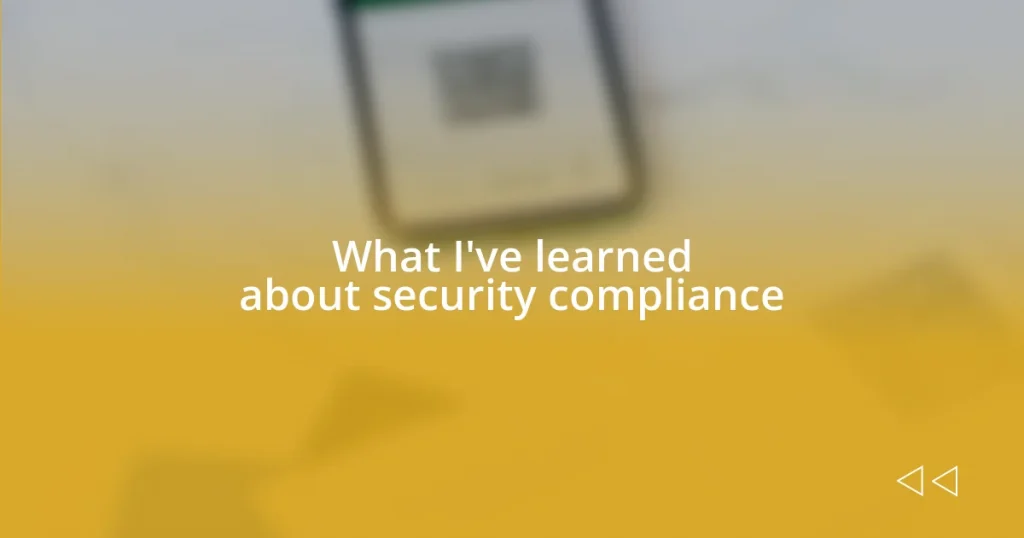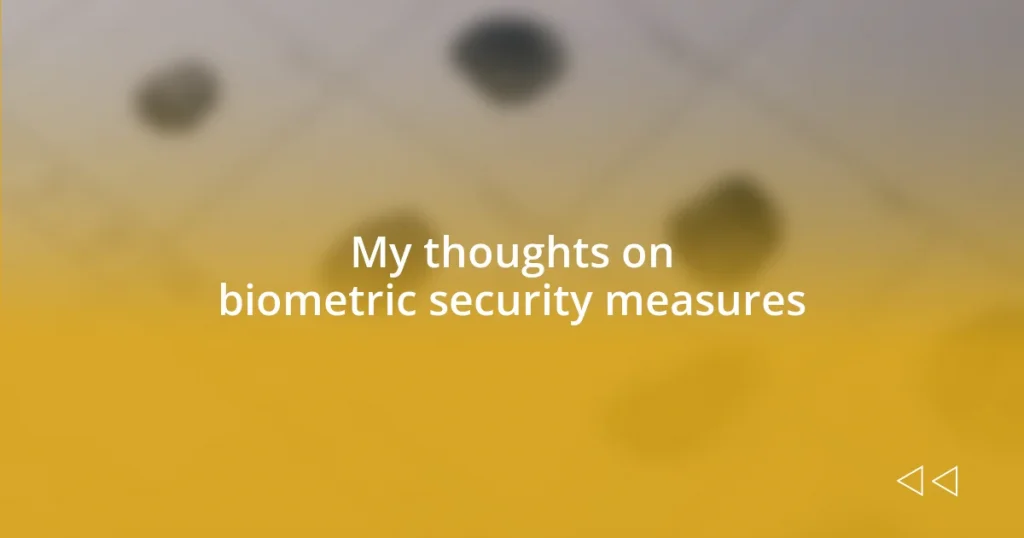Key takeaways:
- Smart contracts automate agreements, enhancing efficiency and reducing dependency on intermediaries, significantly improving transaction speed and cost-effectiveness.
- Challenges include technology complexity, legal recognition issues, and interoperability with existing systems, requiring careful planning and stakeholder communication.
- Best practices for smart contract development involve clear specifications, rigorous testing, and thorough security audits to prevent errors and enhance stakeholder trust.
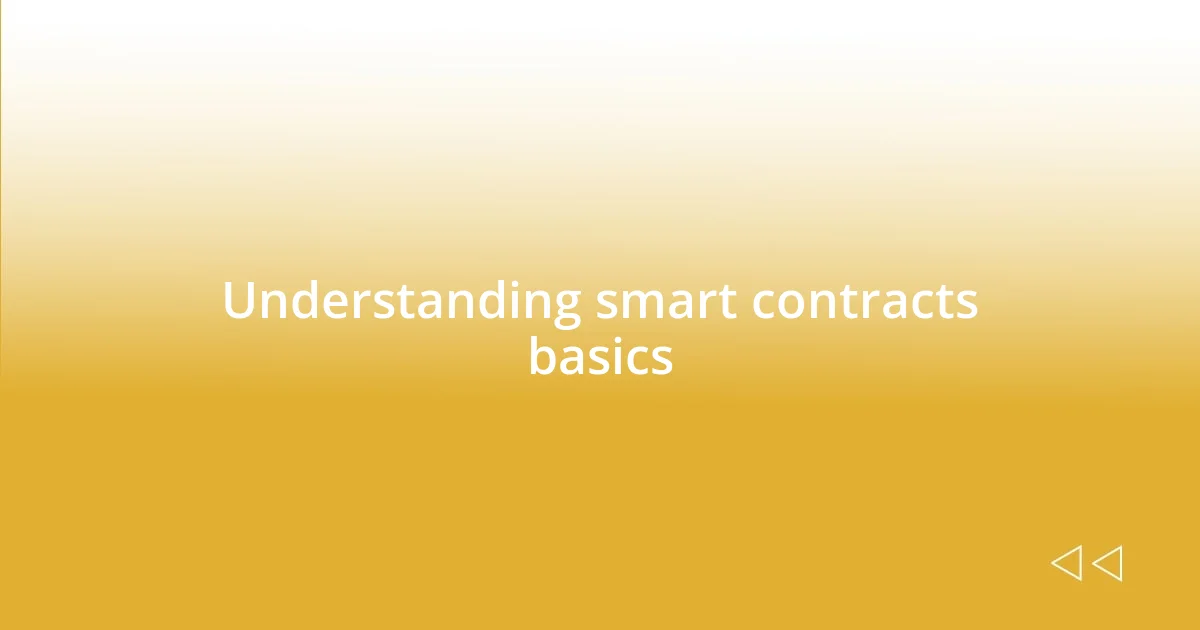
Understanding smart contracts basics
Smart contracts are essentially self-executing agreements where the terms are written into code. I remember the first time I came across one while working on a project; it was like a light bulb went off. The idea that a contract could automatically enforce itself without intermediaries fascinated me. Isn’t it incredible to think about how this technology can increase efficiency and reduce reliance on traditional legal frameworks?
One common question I encounter is, “How do they really work in practice?” From my experience, smart contracts function on blockchain platforms, which ensure transparency and security. This allows all parties involved to trust the process without the need for a middleman. Reflecting on a project where we implemented a smart contract, I felt empowered knowing that the code would handle financial transactions transparently, ensuring everyone received their payments as agreed, right on time.
Another aspect to consider is the immutability of smart contracts. Once deployed, they cannot be changed, which can be both a strength and a vulnerability. I remember feeling a wave of anxiety during our launch, worried about any potential errors in the code. It made me realize how crucial it is to conduct thorough testing before deployment. Isn’t it reassuring to know that such precision can lead to better trust and accountability in our agreements?
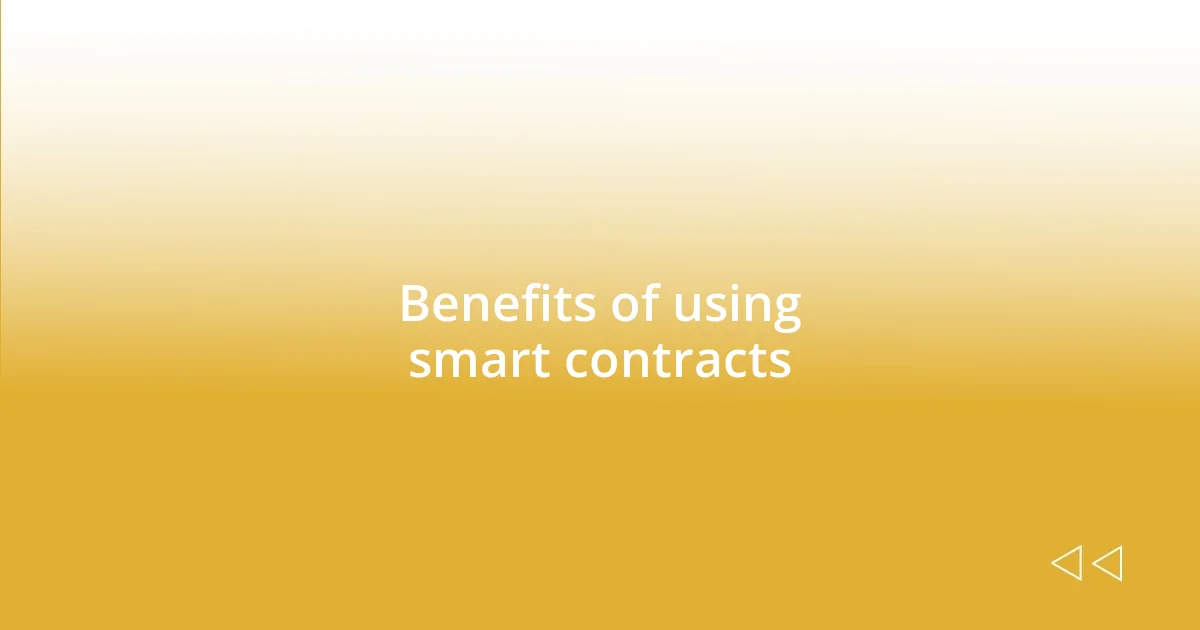
Benefits of using smart contracts
There’s something truly remarkable about the speed of transactions when you utilize smart contracts. In one of my recent projects, we managed to cut down our payment processing time from several days to mere minutes. This rapid execution not only thrilled our clients but also fostered a sense of trust. Don’t you think a quicker turnaround could enhance relationships in any business?
Another significant benefit is the reduction in costs associated with intermediaries. I’ve been involved in projects where traditional contracts required extensive legal oversight, leading to increased expenses. On the flip side, employing smart contracts allowed us to streamline processes without sacrificing quality. It made me realize how pivotal savings could be when reinvested into other project areas.
Lastly, the transparency and auditability offered by smart contracts can’t be overstated. I clearly remember how our stakeholders appreciated having real-time access to transaction records. This level of accountability not only minimized disputes but also boosted overall confidence in our operations. How refreshing is it to know that everyone has clarity on the agreements in place?
| Benefit | Details |
|---|---|
| Speed | Reduces transaction time, leading to quicker execution of agreements. |
| Cost Efficiency | Minimizes expenses by eliminating the need for intermediaries. |
| Transparency | Provides all parties with clear access to transaction records, enhancing trust. |
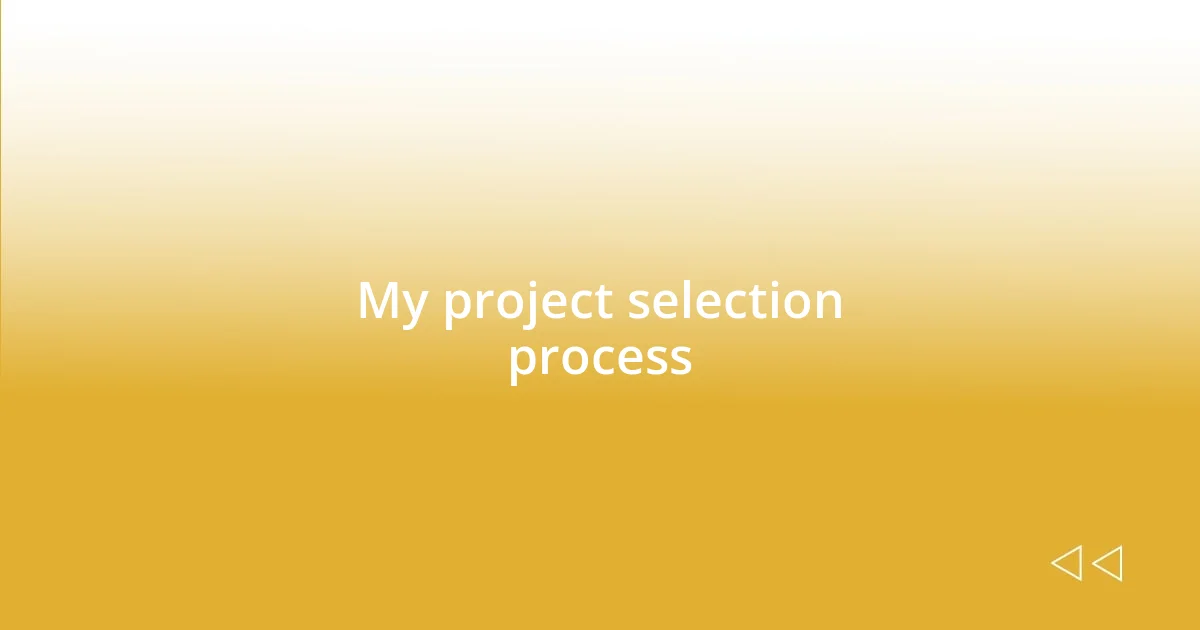
My project selection process
When it comes to selecting projects for smart contract implementation, I have a structured yet flexible approach. I often start by evaluating the project’s objectives and whether they align with the inherent strengths of smart contracts. Reflecting on a project I chose to partner with, the team expressed a strong need for automated transactions to manage funds more effectively. This clarity in objectives was crucial; it helped me understand how smart contracts could add real value to their operation.
In my selection process, I consider several key factors:
- Project Objectives: Does the project clearly define its goals and challenges?
- Use Cases: Are there specific functions that can benefit from automation and transparency?
- Stakeholder Engagement: How invested are the stakeholders in adopting this technology?
- Technical Feasibility: Do we have the right skills and tools to develop the smart contract effectively?
Once these elements are in place, I feel a sense of anticipation and excitement. Choosing the right project is akin to selecting a suitable canvas for painting; each choice can lead to impactful results. With that in mind, I embrace the journey of finding projects that inspire innovation and showcase the potential of smart contracts.
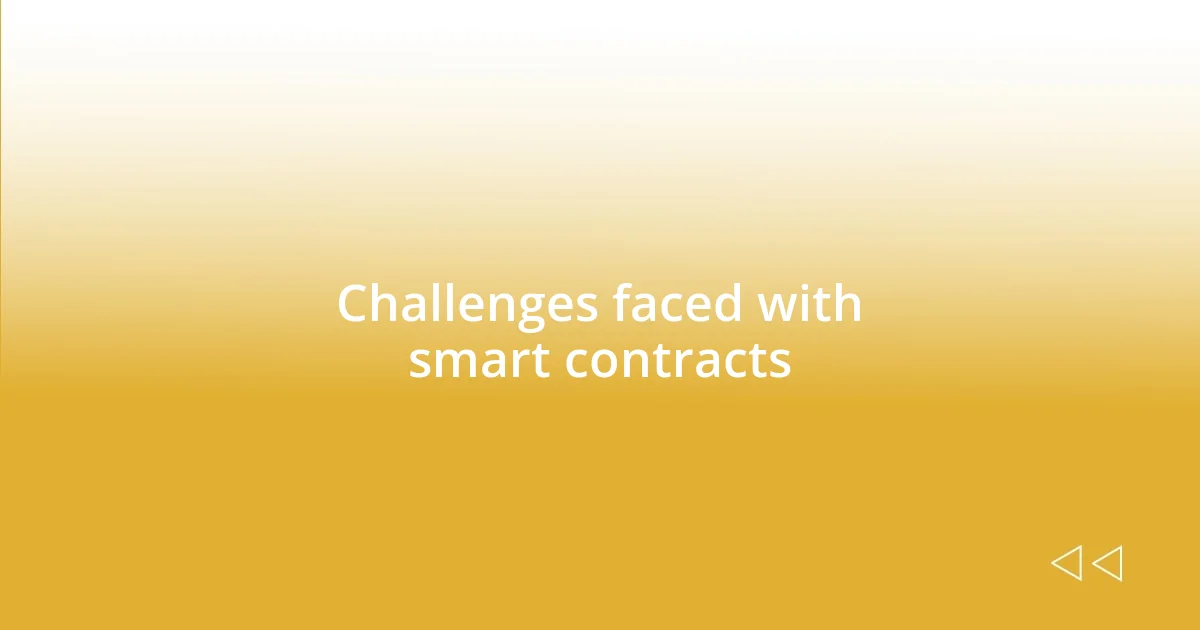
Challenges faced with smart contracts
One of the significant challenges I faced with smart contracts was the complexity of the technology itself. When I first dove into this world, I remember sitting in front of my computer, staring at lines of code that seemed more like a foreign language than a tool for productivity. It was frustrating, to say the least, and I often questioned if I had bitten off more than I could chew. Have you ever felt overwhelmed when learning something new? That sense of confusion can stall progress if not addressed.
Another hurdle I encountered involved the legal aspects surrounding smart contracts. I distinctly recall a meeting with stakeholders who were apprehensive about how these digital agreements would hold up in court. The ambiguity of legal recognition was unnerving, and I realized that ensuring everyone was on the same page required meticulous communication. It’s vital to bridge the gap between technology and traditional legal frameworks, wouldn’t you agree? I found it essential to bring in legal experts early in the process to help alleviate these concerns.
Lastly, the issue of interoperability with existing systems can’t be overlooked. During one project, we faced compatibility challenges that threatened to derail the entire initiative. I vividly remember brainstorming solutions late into the night, contemplating different paths forward. It’s a delicate balance when navigating between old and new technologies, isn’t it? In my experience, spending ample time on integration considerations upfront can save a lot of headaches down the line.

Best practices for smart contracts
When developing smart contracts, creating clear and concise specifications is vital. I recall a project where we initially overlooked this aspect and faced confusion during the implementation phase. It was a lesson learned: ambiguity in requirements leads to miscommunication and ultimately, frustration. Have you ever been part of a project where unclear specifications caused setbacks? I felt that tight collaboration with all stakeholders during the drafting phase helped ensure that everyone was aligned and expectations were managed.
Testing is another crucial practice that I learned through experience. In one instance, I discovered a significant bug only after deployment, which caused havoc and eroded trust. It made me realize the importance of rigorous testing environments that mimic real-world conditions. Utilize automated tests in your development process—it’s a game-changer. I now advocate for a testing phase that is as thorough as possible, comprising unit tests, integration tests, and simulations to catch issues before they become major problems.
Furthermore, I always prioritize security audits as a best practice. While working on a decentralized application, I was surprised by how vulnerable smart contracts can be to exploits. The audit process can feel daunting, but it’s essential to have a third-party expert evaluate your code. Trust me, this step can save your project from catastrophic losses and builds confidence among stakeholders. Have you considered how a single oversight could lead to significant repercussions? That realization led me to adopt a proactive approach to security, ensuring we fortified our contracts before going live.










